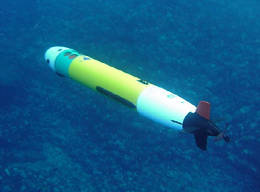Modeled after whale hunting patterns and techniques, the Deep Ocean Remus, (also known as DOR-E), will be used to research and explore the deepest areas in the ocean. Kelly Benoit-Bird along with a group of fellow researchers and oceanography experts from Oregon State University, built the DOR-E from a Remus torpedo. The Remus torpedo is favored by the American Navy, is about 16 feet long, and uses sonar. It can be seen below:

The DOR-E will be a technological advancement in the world of oceanography, because it will be able to "use a two-frequency system to transmit and receive sound waves as it dives up to 2,000 feet.". The DOR-E will be autonomously run, and will map the ocean floor.
(Picture from original article)
The focus in regards to marine life, will be on squids; a favorite Subject of Bird's. She believes that the DOR-E will aid in the tracking and measurements of deep sea squids. Other experts were hesitant and believed that "sonar would never pick up squids’ gelatinous bodies, since they lacked air-filled swim bladders." Bird provided them wrong by successfully tracking the size and movements of deep ocean squids. She even managed to attain information about jumbo squids in the Gulf of California.
Overall, the future of DOR-E in oceanography research is promising. Technology such as this provides viewpoints into natural areas, where humans could not go.
Original Article: http://www.fastcoexist.com/mba/1680893/an-autonomous-sub-speaks-whale-to-explore-the-deepest-ocean

No comments:
Post a Comment